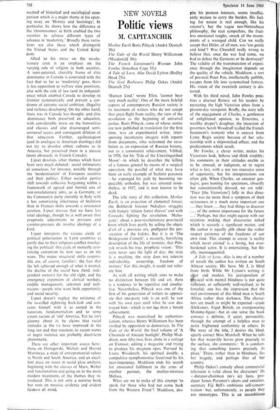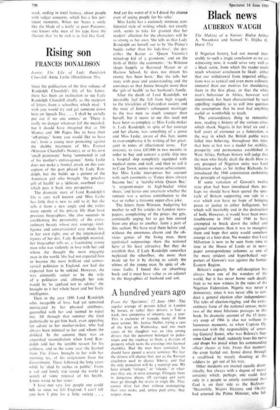NEW NOVELS
Politic views
M. CAPITANCHIK
The Gale of the World Henry Williamson (Macdonald 30s) The French Lieutenant's Woman John Fowles (Jonathan Cape 35s) A Tale of Love, Alas David Lytton (Bodley Head 25s) The God Botherers Philip Oakes (Andre Deutsch 25s)
`Human kind,' wrote Eliot, 'cannot bear very much reality'. One of the more baleful aspects of contemporary Russian society is its treatment of writers who do not accept that great flight from reality, the view of the revolution as the beginning of universal justice. Boris Pilnyak, some of whose stories are now published in translation for the first time, was an experimental writer, inter- spersing incantatory imagery with reports from documents, who welcomed the revo- lution as an expression of Russian history, not as a communist achievement. Vilified, in 1926, for his 'Tale of the Unextinguished Moon'—in which he describes the killing of a famous general by means of a surgical operation, the parallel of what may have been an early example of Stalinist paranoia —he expunged his guilt by becoming im- peccably orthodox, but was arrested none- theless, in 1937, and is now known to be dead.
The title story of this collection, Mother Earth, is an evocation of elemental forces; the Bolshevik forester Nekulyev struggles with hungry 'citizen forest thieves' and with Cossacks fighting the revolution. 'Maho- gany', about a post-revolutionary provincial town which lives partly by selling the objets d'art of a previous era, preftgure4-the per- secution of the kulaks. But it is in `The. Bridegroom Cometh', a masterly, horrifying description of the life of termites, that Piln- yak reveals his true, prophetic vision: 'This state never sees the light of day; the state is a machine, the state does not, tolerate individuality, ownership, freedom of instinct.' For this insight, it could not toler- ate him.
As with all writing which aims to make no distinction between life and art, there is a tendency to be repetitive and unselec- tive. Nevertheless, Pilnyak was one of the first of his generation of writers to appreci- ate that one-party rule is an evil; he saw with his own eyes until what he saw des- troyed him—which is not less than a heroic achievement.
Pilnyak was neutralised by authoritar- ianism. whereas Henry Williamson has been vivified by opposition to democracy. In The Gale of the World, the final volume of 'A Chronicle of Ancient Sunlight', Phillip Mad- dison, now fifty-two, lives alone in a cottage on Exmoor, editing a magazine and trying to produce his magnum opus. Pursued by Laura Wissilcraft, his spiritual double, a 'compulsive nymphomaniac frustrated by his near-impotence, Maddison ends his search for emotional fulfilment in the arms of another pursuer, the mother-mistress Melissa.
What are we to make of this attempt 'to speak for those who had not come back from the Western Front'? Maddison, des- pite his protean interests, seems insuffici- ently mature to carry the burden. His feel- ing for nature is real enough, like his creator's, but the vague neo-Nietzschean philosophy, the nazi sympathies, the fruit- less emotional tangles, smack of the resent- ments of a wronged child. Can we really accept that Hitler, of all men, was `too gentle and kind'? Was Churchill really wrong to believe that, once the war had come, we had to defeat the Germans or be destroyed?
The validity of the transmutation of experi- ence through the imagination depends on the quality of the vehicle. Maddison, a sort of pro-nazi Peter Pan, intellectually gullible, escapes from life into systematised fantasy. His vision of the twentieth century is dis- torted.
With his third novel, John Fowles prac- tises a discreet flattery on his readers by recreating the high Victorian ethos from a piesent-day viewpoint. Briefly, the story tells of the engagement of Charles, a gentleman of enlightened opinion, to Ernestina, a wealthy draper's daughter, the incursion of governess Sarah Woodruff (called the French lieutenant's woman) who is outcast from Lyme Regis society because of her rela- tionship with a shipwrecked officer, and the predicaments which result.
Mr Fowles, a clever writer, makes his Victorians look, behave and think credibly; his comments in their attitudes enable us to be amused, or indignant, or to regret what is lost, with a not too excessive sense of superiority, but his interpretations are often glib. When Charles, an amateur geo- logist, goes hunting for specimens, absurdly but conventionally dressed, we are told: `Their [the Victorians'] folly in that direc- tion was no more than a symptom of their seriousness in a much more important one ... they knew ... they had things to discover .... of the utmost importance for the future
...9 Perhaps, but that might equate with our
scientists making their discoveries naked which is scarcely a significant matter, and the author is equally glib about the rather suspect existence of the freedoms of our otvn time. This attempt to create 'a reality which never existed' is a loving, but over- burdened satire. It is entertaining, but fin- ally, inconsequential.
A Tale of Love, Alas is one of a number of novels the author has written on South
African society. His hero, Mr J, is blind from birth. While Mr Lytton's writing is
g4r and modest, his juxtaposition of ysical with mental blindness is not quite ufficient, or sufficiently well-realised, to be forceful; one has the impression that the
real environment of this blind man is South Africa rather than darkness. The charac- ters are much as might be expected—crude Afrikaners, frigid British, an overpowering Mammy-figure—but in one sense the book conveys a definite, if quiet, personality, through the attempt of a helpless man to resist frightened conformity in others. In the story of the title, J desires the blind, utterly correct Miss Marshall. When he tells her that water-lily leaves grow precisely to the surface, she comments: 'It is comfort- ing that something knows precisely its place.' There, rather than in blindness, lies her tragedy, and perhaps that of her country.
Philip Oakes's comedy about commercial television is valid about his characters' ills
—dictator-chairman DD's icy lusts, pro- ducer James Paramor's ulcers and anxieties, secretary Fiji Bell's ambitious self-concen- tration—but, unfortunately, as people they are stereotypes. This is an unambitious work, ending in total fantasy, about people with vulgar concerns, which has a few per- tinent moments. When DD 'bares a smile like the blade of a knife' at poor Paramor, one knows why men of his type have the illusion that 'to be rich is to feel like God.'



































 Previous page
Previous page